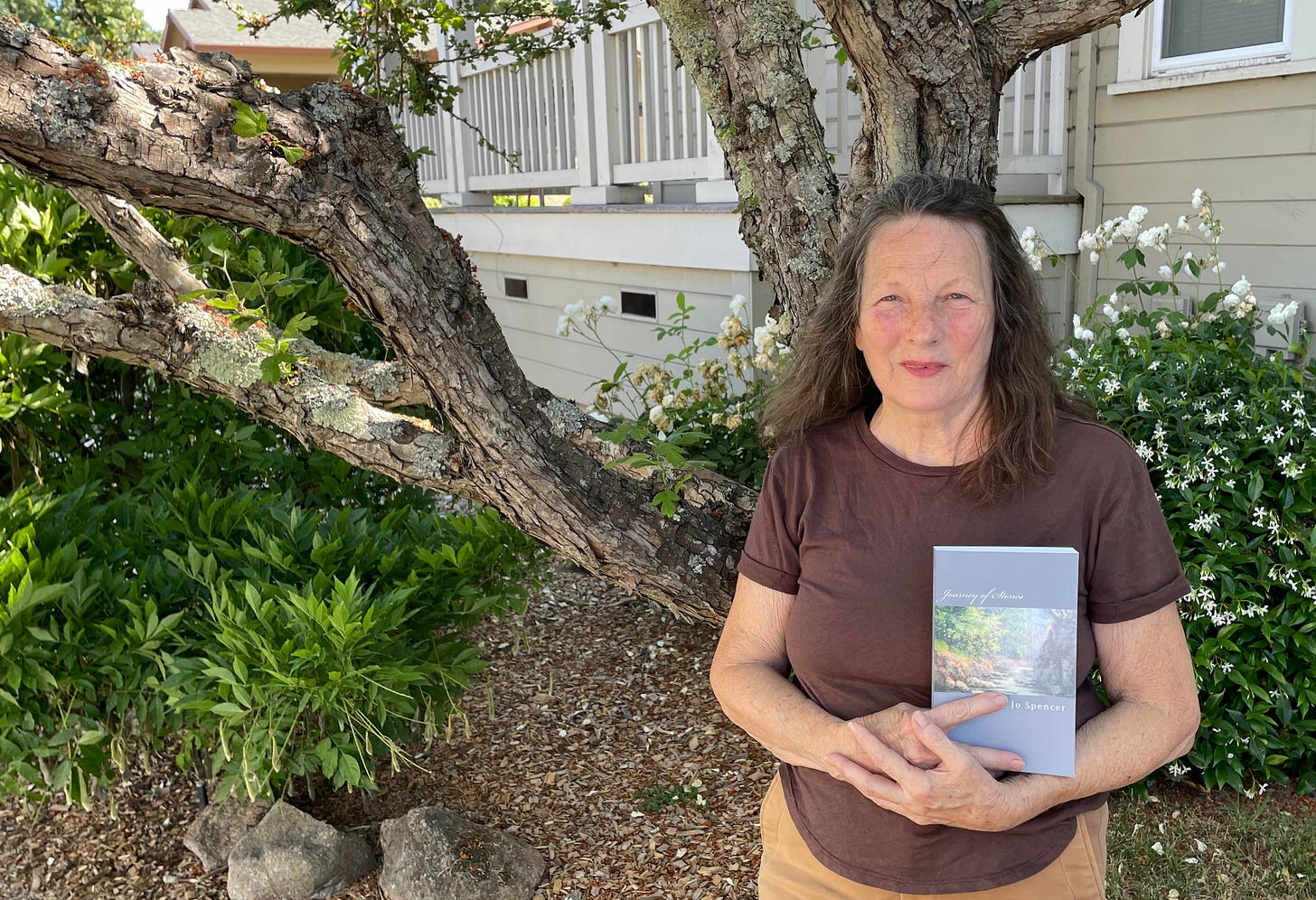Turning family history into historical fiction
Jo Spencer's interest in genealogy has spurred her to write more than a dozen self-published books of historical fiction and two non-fiction books about slavery in Kentucky
Like many Americans, Jo Spencer grew up being told that she had Native American ancestry, and she always wondered if it was true. Twenty-two years ago, after she moved to Sonoma County, she decided to find out. She left a message on a genealogy message board in Tennessee.
“I said who my grandparents were, and I said I think I am part Native American, probably Cherokee, but I don’t even know where to get started. And within a few hours, a distant cousin emailed me back and said, ‘I know the answer to your Cherokee riddle.’”
Turns out Spencer was a descendant of the English explorer Gabriel Arthur and his Indian wife. Their son, also named Gabriel Arthur, married an Indian woman named Nikitie, who was a scout for George Washington.
“So that got me hooked,” Spencer said. “I just started researching my own family in Kentucky and Ohio. And then right away I had other people wanting my help to research their lines.”
She does almost all of her research online, but like all genealogists, she’s dependent on the historical record.
“The federal census started in 1790 and was done at least every 10 years. But until 1850, all you would have are the heads of households—and maybe, if you were lucky, the first name of the wife,” Spencer said. “Beginning in 1850, the census-taking process became much more elaborate. And so those census records are just a wealth of information.”
Spencer has written 13 historical romances, as well as a religious autobiography and two books about African American history in Kentucky. All are self-published through Amazon. Spencer’s historical fiction is set mostly in Kentucky in the 1800s, but also in Ireland and England. One book details a trip by covered wagon and horse to northern California in 1878. Her characters and settings are drawn from her historical and genealogical research and from her own life growing up in Appalachia. Her biography on Amazon said, “She writes as a way to discover herself and hopes her books lead her readers to a deeper relationship to themselves and their world.”
Spencer grew up in Middletown, Ohio—a background she shares with soon-to-be vice president J.D. Vance. Like Vance, her family hails from the hill towns of Kentucky.
“I read Hillbilly Elegy, but haven’t seen the movie,” Spencer said. “My family history is so similar to J. D. Vance. His grandparents were born in eastern Kentucky and migrated to Middletown. My mother was born in Hazard, Kentucky, and also moved to Middletown, as did three of her siblings. Armco Steel sent recruiters ‘down into the mountains’ to recruit workers. Many of the men in our life worked at Armco. It was a common migration pattern for many families.”
Growing up where she did, she said the past feels very close.
“I’m 70, so the Kentucky of my earliest childhood really was a 19th-century life,” she said.
Interestingly, Spencer developed a side specialty in African American genealogy.
“Probably about 50% of my research has been for African American families,” she said. “I never charge them to do research. I feel like it’s something I can do to make up for what their families have been through.”
Her interest in African American genealogy led her to write a non-fiction book called, “Slavery in Southeastern Kentucky: A Buried History.”
“My book is the first and only in-depth investigation of slavery in the nine southeastern counties of Kentucky,” she said.
“I grew up with incredible racism, incredible segregation. In Wolfe County, Kentucky, by the time I was a child, all black people had been driven out or had left —I don't say migrated because that’s not what happened,” she said. “Middletown, Ohio, which is in between Cincinnati and Dayton, was so segregated that I have a memory of seeing only three black people before I was 15 years old.”
“I was always told where I grew up that our ancestors were too poor to have slaves…but I proved that that wasn’t the case,” she said. “Two of my ancestors were slave owners.”
She has also done genealogical research about one of Sebastopol’s early pioneers.
“I was in the process of applying to become a board-certified genealogist”—a project that’s on hold for now—“and one of the projects I did for that was a history of the Jasper O’Farrell family,” she said. “My task was to prove three generations of Jasper O’Farrell’s family. Jasper O’Farrell was born in Ireland, and after he got here, he sent for his mother and three of his siblings. So I started with his mother and father’s generation and then Jasper O’Farrell’s and then his daughter Elena, who never married, and I did this 30-page narrative about that family.”
Like her work on Kentucky, she found that the historical record in Sonoma County also reflected the racism of the time. Speaking of the 1850 census, she said, “Of course, the Native Americans weren’t being enumerated. So you’re seeing the Mexican or Californio families and you’re seeing white families but not the Indian families.”
Spencer said it takes a certain kind of person to be a good genealogist.
“You have to have the ability to be incredibly focused,” she said. “I just was fascinated from the beginning and then to be able to give people their ancestors—to literally say, here’s your great grandmother or to show people photographs of ancestors they didn’t know about—that’s just so rewarding.”
You can find her books on Amazon here. For more information or if you’re looking for someone to do genealogical research on your family, reach her jospencer77@gmail.com.


